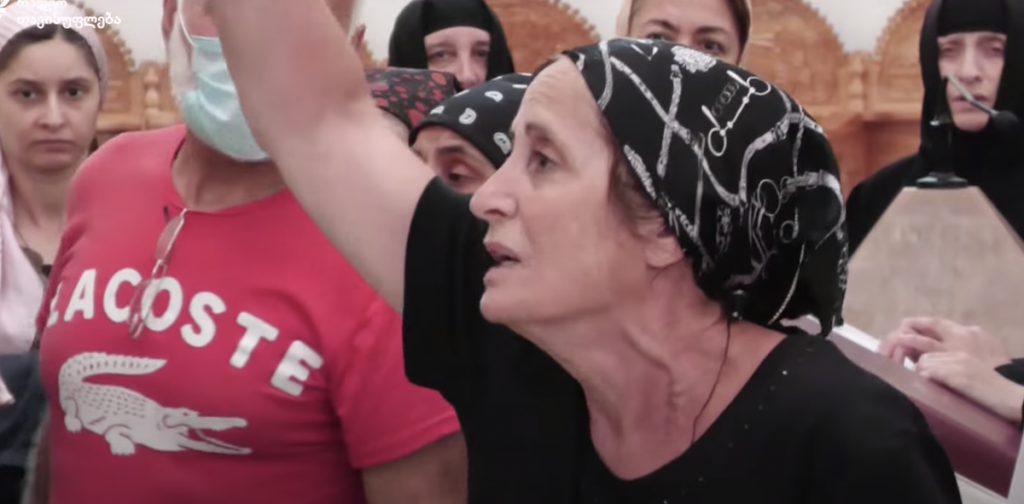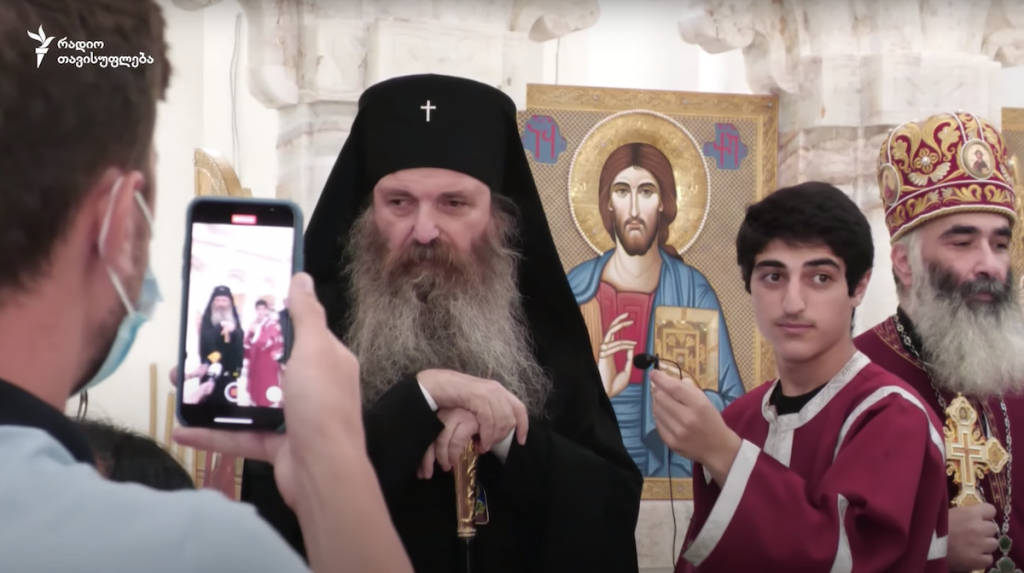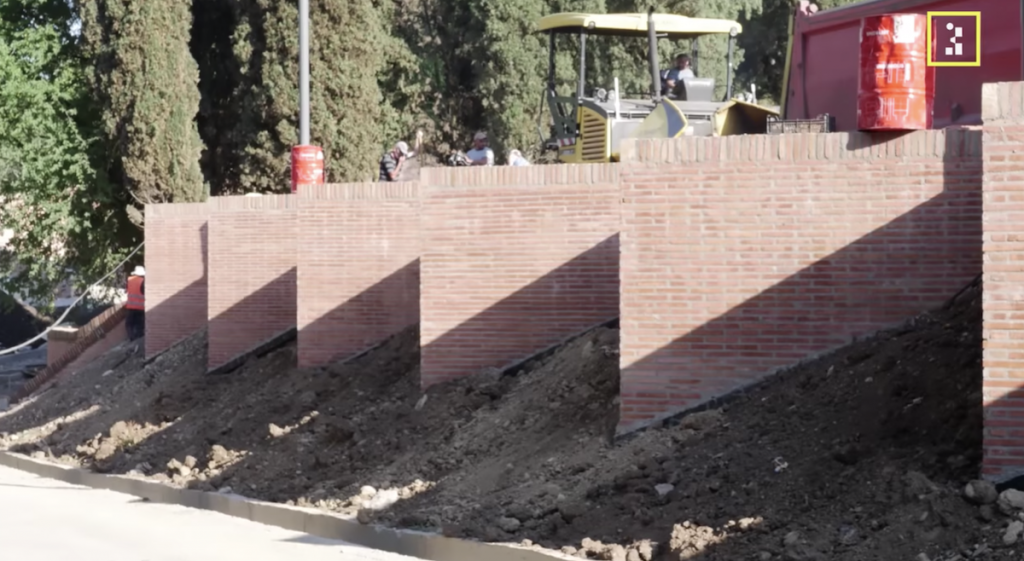Bodbe Resident disrupts sermon, accuses Georgian Patriarchate of land seizure, spreading hate
Church seizes land and sows hatred, activists say Bodbe
A resident of the village of Bodbe in the Kakheti region of Georgia accused a local high-ranking cleric and Georgian clergy in general of provoking violence against journalists and activists in Tbilisi on July 5. She also accused the church of seizing lands that belong to the village.

Anna Khunashvili was present at the sermon, which was conducted in the famous local church of St. Nino by the Bishop of Bodbe, a member of the Holy Synod, Reverend Jacob. At the end of the sermon, she turned to the bishop saying that the clergy kindled opposition and hatred.
Khunashvili spoke about the events in Tbilisi on July 5, when aggressive groups attacked journalists and civic activists at the call of the Patriarchate. On July 11, one of the victims, Lekso Lashkarava, operator of the Pirveli TV channel, was found dead at his home.
- Anti-vaxxing, homophobia, pro-Russian sentiments – is the church an obstacle on Georgia’s pro-Western course?
- Coronavirus and the Church of the Last Days – why the Georgian church won’t cancel church services
- Capital of the Patriarchate: Property of the most influential institution in Georgia
Khunashvili’s speech was filmed by journalists and the recording was later disseminated on social media, making it a center of heated discussions, and, according to the majority of the polls, Georgian Patriarch enjoys the support of 80% of the population. Thus, such a public display of discontent is a relatively rare occurrence in the country.

“Where were you, where was the Patriarchate [during the violence in Tbilisi on July 5]? Did the representatives of the Patriarchate behave well? I think this is not a sermon, it is a step backward for the nation. Let’s kill everyone? Why are you against journalists, what do you want? This is not a sermon, this is not a striving for love, this is not real Orthodoxy”, said Ana Khunashvili.
She also said that “the clergy are doing business and are seizing land in the village”.
“There is no village, they razed [destroyed] everything. This is your business. People were deprived of their lands, they took everything. The patriarchy wants all this very much. Why do you need so many hectares of land? You are using hired labor, you have become an enterprise, nothing more”.
What is the significance of Bodbe?
The villages of Zemo-Bodbe and Kvemo-Bodne are located in the Sighnaghi region in Kakheti. This is a special place with a historical and religious context. According to legend the grave of St. Nino, who brought Christianity to Georgia is located there.
The famous Bodbe convent is also located here, which covers an area of several hectares. According to local residents, with the support of local authorities, the abbess of the convent Abbess Theodora, as well as the archbishop of the Bodba diocese, Jacob, have been seizing the lands of local residents for years and increasing the monastery property.
The Georgian media reported a lot about the story of 63-year-old Tamaz Gorelishvili, a resident of the village of Kedeli. He unexpectedly discovered that a piece of land belonging to him was in the possession of a monastery, and centenary walnut trees were cut down there:
“I saw that they had destroyed about a hundred trees, all my walnut trees, apple trees, and other fruit trees. This is the house of my grandfather and father, I have the decision of the then executive committee [the village administration in Soviet times] that it is mine. But when I wanted to formalize this land, the administration told me: go and deal with the abbess of the monastery. She didn’t even accept me. And then it turned out that she planned to seize this place”, Gorelishvili says.
Ana Khunashvili is also from the village of Kedeli, and her family also suffered. She claims that the Patriarchate took away their agricultural land.
Khunashvili’s husband, Goderdzi Gordeziani, rented land in the village for years, and then the state offered him to privatize it. But a few months later, the privatization document was unexpectedly canceled.
The case was investigated by the social organization Center for Social Justice. “We have not found grounds for annulling the document on privatization, especially since it was proposed by the state itself. Now this land belongs to the Patriarchate, the family has not received any compensation”, says Keti Chutlashvili, a lawyer at the Center for Social Justice.

Zurab Vardiashvili, director and journalist for the Publika news site who worked on Bodbe, told JAMnews that this practice has been going on for many years:
“This is not a new story. The inhabitants of Bodbe have been protesting against the land grab for years, but they are fighting in vain. There were repressions, interference by thieves in law, pressure from the authorities, and, in the end, as a result of the mafia, state and church terror, people were left without bread”, Zurab Vardiashvili said.
According to him, the situation became especially complicated after mother Theodora became the head of the Bodbe monastery. Ana Khunashvili says the same thing in a conversation with Jacob.
“Mother Theodora, who runs the Bodbe Monastery, turned out to be a person with a business mind. She is close with the local authorities, and with their help, the lands not registered in the register will be transferred to the ownership of the monastery”, Vardiashvili said.
Legal registration of land plots in Georgia in the past
This practically did not happen. Indigenous peoples inherited and disposed of land allocated (or redistributed) by hereditary agreement over the centuries. Land registration is still a problem in the country due to complex procedures, so there are still many unregistered private land plots.
Around the Bodbe monastery, in the village of Kedel, there was a lot of such land, which was given to the local residents by their grandparents.
Suddenly these lands became the property of the Patriarchate.
“Lands that are not registered are put up for auction by the state and the Patriarchy buys them out at a symbolic price. The owner has no desire to sell this land, but one day their land will become the property of the Patriarchate”, Zurab Vardiashvili said.
This is a video made by the Public from the village of Kedeli last year:
According to Keti Chutlashvili, in some cases, the Patriarchate even appropriated the road along which people moved in the village, as a result of which the townspeople living in the neighborhood could no longer move freely. According to him, some families have even reduced their personal plots.
According to Zurab Vardiashvili, the monastery needs more land for business and enrichment. Bodbe is one of the most important centers of religious tourism in the country, which is constantly full of tourists and believers.
“They have created a brand, a business, and now they need more and more territories”, Vardiashvili said.
Kobosto and beans are now grown on the site of Tamaz Gorelishvili’s ancient walnuts.
According to Gorelishvili, the felled trees have been transferred to the Patriarchy for firewood, and the harvest is sold in various shops in Tbilisi.
“I tended my walnut trees like children. When I went and saw the broken one, I cried bitter tears. I started to kick these people out of there. The police arrived. I showed my document, and they told me that we have no right to anything and brother, get used to this story. I kept the family with you, brought potatoes and eggplants. It was my income, and that’s how these strong believers killed me”.
● The capital of the Georgian Orthodox Church has grown steadily since the collapse of the Soviet Union. Today, the Patriarchate owns and manages more than 62.7 square kilometers of land, which is almost equal to the area of the city of Batumi.
● The Patriarchate received 96% of the land from the state and private individuals for free ownership and temporary management.
● Since 2002, over 285 million lari has been transferred to the Patriarchy from the central and local budgets.
● The Georgian Church is headed by 47 members of the Synod, 41 of whom are involved in the economic activities of the Patriarchate. Most of the members of the Synod own substantial property.
● As of 2017, the Patriarchy has 40 business entities, shares in 4 other companies and 105 non-governmental organizations.
● The main area of business and non-governmental activities of the Patriarchate is education. However, they also have oil importers and alcohol producers.


















